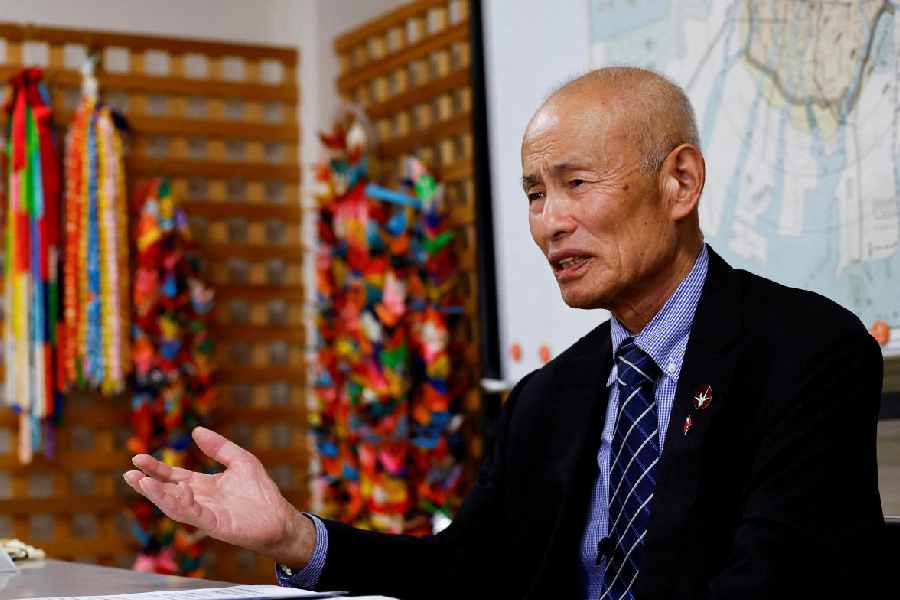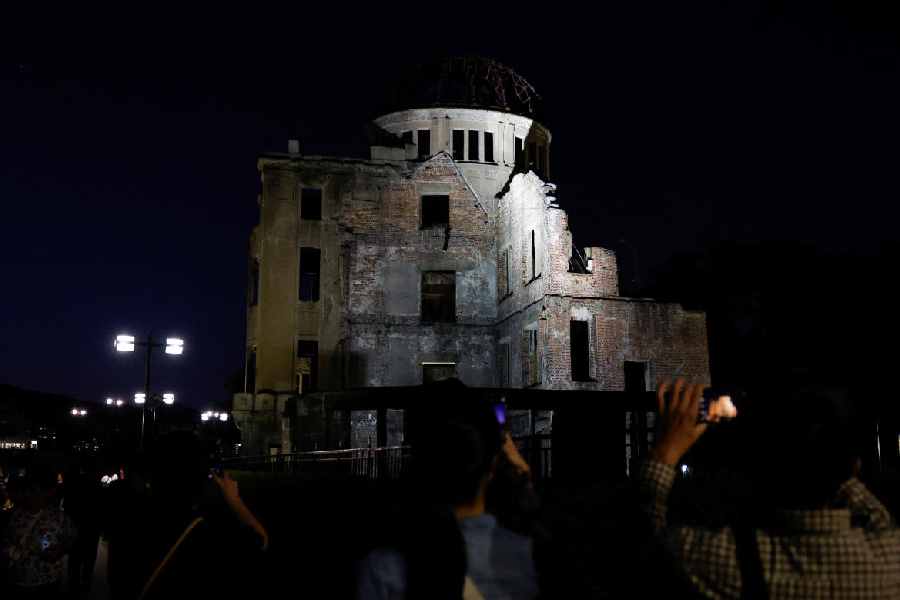Cities blasted to rubble. Burned bodies and flayed flesh. Invisible waves of radiation coursing through the air. And the indelible image of a mushroom cloud.
The atomic bombs dropped by the United States on the Japanese cities of Hiroshima and Nagasaki showed the world what an apocalypse looks like. Tens of thousands of people died in the immediate aftermath.
But some emerged from the devastation. Struggling with survivors’ guilt and sick with illnesses caused by the radiation, they were shunned for years as living reminders of the human capacity to engineer horror.
On Friday, Nihon Hidankyo, a collective of Japanese atomic bomb survivors, was awarded the 2024 Nobel Peace Prize for its decades-long campaign to rid the world of nuclear weapons.
The group was honoured by the Norwegian Nobel Committee for “demonstrating through witness testimony that nuclear weapons must never be used again”.
The survivors of the bombings — more than 100,000 are still living — “help us to describe the indescribable, to think the unthinkable, and to somehow grasp the incomprehensible pain and suffering caused by nuclear weapons,” Jorgen Watne Frydnes, the committee chairman, said.
The Nobel committee noted that although nuclear weapons have not been used since the Japanese cities were attacked by American bombers in August 1945, nuclear powers are modernising their arsenals and other countries are trying to join the nuclear club.
The committee did not name any specific nations. But President Vladimir V. Putin of Russia has threatened to use tactical nuclear weapons in Ukraine. And concerns are growing about nuclear proliferation in the Middle East and Asia.
“At this moment in human history, it is worth reminding ourselves that nuclear weapons are the most destructive weapons the world has ever seen,” the committee said.
Other Nobel laureates have been awarded the Peace Prize for their campaigns against nuclear weapons, including the chemist turned activist Linus Pauling in 1962 and the International Atomic Energy Agency in 2005.
It was nearly 80 years ago, on August 6 and 9, 1945, that American B-29 bombers dropped two atomic weapons, code-named Little Boy and Fat Man, on Hiroshima and Nagasaki. The Nobel committee said that about 120,000 people were killed by the detonations. A similar number died from burns, injuries and radiation-induced diseases in the months and years that followed.
That first and only use of nuclear weapons was followed by the end of World War II, but also by a nuclear weapons arms race. In the deserts of China and Algeria and on the atolls of the South Pacific, nuclear powers tested increasingly more powerful weapons that spewed harmful radiation.
Today, nine countries are considered nuclear powers: the United States, Russia, France, China, Britain, Pakistan, India, Israel and North Korea. There are nearly 13,000 weapons in the global nuclear stockpile, according to the Union of Concerned Scientists.
In Japan, the payloads dropped on Hiroshima and Nagasaki echoed far beyond the ruined cities. A once martial Japan blossomed into a culture that has dedicated itself, even in its Constitution, to peace. Japanese children flashed peace signs for photos and Olympic ceremonies in Japan featured white doves. But many Japanese felt more comfortable averting their gaze from the hibakusha, or “the people affected by bombs”, as the Hiroshima and Nagasaki survivors are known.
For many in Japan — and in the US — the hibakusha represented something that they didn’t want to see.When Terumi Tanaka, a representative of Nihon Hidankyo, visited the United Nations in 1976, he was shocked to discover that, at the time, the ruination caused by the atomic bombs was not that well known. The United Nations had drastically downplayed the death toll.
Some Japanese feared that radiation-induced diseases were contagious, and hibakusha worried about their marriage and career prospects. Sunao Tsuboi, the onetime chairman of Nihon Hidankyo who was a little over a kilometre from the centre of the Hiroshima blast when it went off, recalled that he and his fiancée took sleeping pills in a suicide pact after being told by her parents that they could not wed because he was a hibakusha. (They survived and married, and Tsuboi met President Barack Obama when he visited Hiroshima in 2016.)
“Starting with the inhumane acts of Hiroshima and Nagasaki, we were oppressed by the United States and abandoned by the Japanese government for a long time,” Sueichi Kido, the secretary-general of Nihon Hidankyo and a survivor of the Nagasaki bomb, told NHK, the Japanese broadcaster, on Friday.
When Nihon Hidankyo formed in 1956, its founding declaration described the stigma of outliving nuclear annihilation. “We have survived until now in silence, with our heads down,” the statement said.
In the years after the war, the hibakusha were living evidence of the fact that the US, which occupied Japan after World War II and imposed upon the nation a Constitution that renounced war, had caused the destruction of Hiroshima and Nagasaki.
The hibakusha were also a counternarrative to a Japan that was developing into a high-tech economic giant fuelled, in some cases, by nuclear power. The 2011 earthquake and tsunami, which led to a meltdown at a nuclear power plant in Fukushima, once again forced a national moment of reflection. Since the nuclear accident, most of Japan’s nuclear reactors remain shuttered.
These days, the hibakusha, whose largest grouping is Nihon Hidankyo, are celebrated for their continued campaign against nuclear weapons despite the obstacles. Many have dedicated their lives to recounting their stories of loss and pain, in an effort to ensure that the world comprehends the profound terror that a nuclear war could bring.
The Nobel committee said that such witness accounts “have contributed greatly to the establishment of a nuclear taboo”.
But that taboo, said Frydnes, the Nobel committee chairman, “is under pressure”.
Henrik Urdal, the director of the Peace Research Institute Oslo, said in a statement that threats by both longtime nuclear powers and by newer actors show the crucial timing of the prize awarded to Nihon Hidankyo.

Japan Confederation of A- and H-Bomb Sufferers Organizations (Nihon Hidankyo) co-chair Toshiyuki Mimaki, who survived the 1945 atomic bombing of Hiroshima, gestures as he speaks during an interview with Reuters on the following day of Nihon Hidankyo winning the 2024 Nobel Peace Prize, in Hiroshima, western Japan, October 12, 2024. Reuters
“In an era where automated weapon systems and AI-driven warfare are emerging, their call for disarmament is not just historical, it is a critical message for our future,” Urdal said.
In awarding the peace prize to Nihon Hidankyo, the Nobel committee said that even though the hibakusha are growing old, a new generation of Japanese could campaign for nuclear disarmament.
But Japan’s neighbours include Russia and China.
Toshiyuki Mimaki, the chairman of Nihon Hidankyo, said on Friday that hisforemost wish was for the world to “please abolish nuclear weapons while we are alive”.
Mimaki is 82.
New York Times News Service











